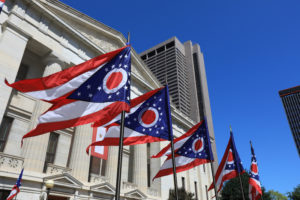
The Regulatory Review unveils its special election feature, starting with daily, on-site reporting on the Democratic National Convention.
All eyes were on Philadelphia in late July, as the Democratic Party kicked off its national convention. With this historic event taking place in the University of Pennsylvania’s hometown, The Regulatory Review dispatched a team of staff writers to the Convention arena, where they reported on the highlights of each day’s events. Along with this daily reporting, The Regulatory Review featured insights from some of the Convention’s notable attendees on the implications of this election for significant regulatory issues.
The week of the Democratic National Convention also marks the launch of The Regulatory Review’s special focus on the U.S. election. This page features The Regulatory Review’s complete coverage of the latest regulatory-related election news and analysis.
Expanding the Right to Vote
November 8, 2016 | Joshua A. Douglas
Despite the trend of restrictive new rules on voting, a positive trend is developing in other places: some states and localities are enfranchising more people and making voting easier. From expanding the electorate, to adopting online voter registration or automatic voter registration, to making the voting process itself easier and more convenient, states and localities are actively engaged in democracy-enhancing efforts.
Hill Briefing Addresses Regulatory Challenges for Next Administration
November 4, 2016 | Alex Kang
Academics and politicians have discussed what this electoral period could mean for the regulatory landscape. Because regulation touches upon each of these vastly different topics, and often dictates their trajectory, many have found it necessary to explore how the regulatory process has changed and how it can be improved going into the future.
$85 Billion AT&T Deal Takes Center Stage as Election Nears
November 3, 2016 | Alex Walsh
During a campaign stop in Gettysburg, Pennsylvania, Donald Trump said of the rumored AT&T and Time Warner mega-merger: “Deals like this destroy democracy.” The official announcement of the $85.4 billion deal then invited speculation about what action the future President could take to stop it.
Donald Trump, the “Workers’ Party” Candidate, on Regulation
October 24, 2016 | Brian F. Mannix and Susan Dudley
Donald Trump has signaled a potential shift for both the Republican Party and regulatory policy. When asked what the Republican Party would look like in the future, Trump said: “You’re going to have a worker’s party.” His workers first regulations represent be a shift from the regulatory consensus on cost-benefit analysis.
Second Presidential Debate Sees Personal Attacks Interrupted by Occasional Policy
October 12, 2016 | Taylor Daily
The second presidential debate followed a town hall format, with moderators Anderson Cooper and Martha Raddatz selecting questions from both debate audience members and social media contributors. Although the debate began with personal attacks, it occasionally took a more substantive tone as the night wore on.
Drug Price Lowering Solutions from the Campaign Trail
October 11, 2016 | Sara Bodnar
In the wake of rising prices for drugs and products like EpiPens, both Hillary Clinton and Donald Trump support allowing the government to negotiate prices of drugs covered by Medicare. Currently, private plans that administer Medicare’s prescription drug benefit individually negotiate with drug companies for lower prices.
Hillary Clinton Rallies West Philadelphians to Register and Vote
September 28, 2016 | Leah Wong
Hillary Clinton visited west Philadelphia in August to rally local citizens and further her campaign’s goal of registering three million new voters. Clinton also took the opportunity to highlight her key campaign priorities.
In First Presidential Debate, Candidates Spar over Economy, Crime, Trade
September 27, 2016 | Taylor Daily
The first presidential debate saw an occasionally substantive discussion of policy. The discussion, directed by moderator Lester Holt, began with a focus on the economy, transitioned for a time to crime and race relations, and ended with a revealing argument about foreign policy.
Dispatches from the DNC – Day 4 Recap
July 29, 2016 | Taylor Daily
The final night of the Democratic National Convention featured an address by former Secretary of State Hillary Clinton, now the official Democratic candidate for President. Clinton appealed broadly to progressives as well as Republicans and independents.
Dispatches from the DNC – Day 3 Recap
July 28, 2016 | Price Felker
The third day of the Democratic National Convention was fittingly titled, “Working Together”—a theme that was on full display throughout the evening as the Democratic Party continued its push to unify after several days of discord. Wednesday’s speakers praised Hillary Clinton and President Obama as they expressed a desire to build on his work under a new Democratic administration
Dispatches from the DNC – Day 2 Recap
July 27, 2016 | Paul Stephan
The second night of the Convention showcased former Senator Hillary Clinton’s record on issues relating to children, social justice, women and families, homeland security, health care, and global leadership. Many of Tuesday’s speakers, including former President Bill Clinton, made clear that Democratic Party leaders think that the best path forward is to come together in support of their now official standard-bearer, Hillary Clinton.
Dispatches from the DNC – Day 1 Recap
July 26, 2016 | Jane Seu
The theme of the Democratic National Convention’s opening night was “United Together,” which initially had been aimed at underscoring the Democratic Party’s focus on keeping American families together, protecting American workers, and ensuring equality. And although this theme did focus on those objectives, “United Together” appeared to be largely defined in terms of uniting the Democratic Party itself, after a recent massive email leak.
Redistricting Law Refined
July 19, 2016 | Daniel Tokaji
The Supreme Court case, Harris v. Arizona Independent Redistricting Commission, lies at the intersection of two important developments in the law of redistricting: the use of independent commissions to draw district lines, and the refinement of the one person, one vote rule. A brief look at the history of redistricting is vital to understanding Harris’s significance as well as the bigger issues the decision implicates.
A Forecast of the Next Five Years in Regulation
May 12, 2016 | Sara Bodnar
To celebrate its Fifth Anniversary Series, The Regulatory Review hosted a diverse panel of experts to look ahead at the next five years of regulation. Panelists were asked to identify the nation’s regulatory priorities, which sparked a lively debate about where regulators should best focus their future efforts: on greater implementation of cost-benefit analysis, increasing transparency, promulgating more rules, or doing a retrospective review of current rules.
Campaign Finance’s Creeping Deregulation
April 20, 2016 | Richard L. Hasen
The rules regulating money in federal elections have become increasingly loosened due to court rulings, bureaucratic shortcomings, political gridlock, and aggressive election lawyers. The result is that spending unlimited and undisclosed sums to influence our federal elections has become child’s play. Given the deregulatory path campaign finance is on, even a new, more liberal Supreme Court majority would do little to fix the problems.
The convention hall photo above is reproduced with the permission of Flickr user Hajee.



